- Home
- Bronwyn Scott
One Night with the Major Page 11
One Night with the Major Read online
Page 11
In the trees a kingfisher trilled. He should give up the military, at least the active part of it. Perhaps he should write to his commanding officers and start the process of seeking out a desk job, something safe and staid in London. The train made London closer these days. Perhaps they could even get a small house in the city. There were new suburbs, respectable homes in Bloomsbury they could afford on his salary. They could spend the holidays and summers here in Somerset.
It was a difficult sell, though. He’d worked hard for his career, for his rise up the chain of command. It was no easy thing to contemplate limiting himself to a desk and paperwork. And yet, it must be done if he wanted to see his child born, to see his child grow to adulthood, to take care of his wife. Pavia stirred in his lap and something fierce woke within him. He loved his friend, but he would not make Fortis’s mistakes. Fortis had been an imperfect husband. Cam would not leave behind a widow. He’d seen Avaline’s face the day he’d told her the news. Whatever their marriage had been, she’d been truly devastated. Never mind they’d lived apart, separated by Fortis’s career and perhaps more, for the years of the marriage. As long as Fortis had lived, there’d always been hope he’d come home, that maybe this time he’d choose to stay, that they could start over. Now Avaline was alone, her position in the world insecure. Perhaps it was a blessing there’d been no children for them. That meant one less person affected by Fortis’s death. Cam would not choose such a destiny for his little family.
He looked down at his wife, sleeping in his lap. He let the newness of that word ‘wife’, and all it entailed, sweep through him. He was a married man now. He made a private pledge. His family would be provided for. If that provision came at the expense of having a desk job, of watching others march out for glory, then so be it. His family needed an income. The military was the only way for him to provide it now that his grandfather had stopped his allowance and there was no bridal dowry. He’d not expected one and Honeysett had made it plain none would be forthcoming. Still, the facts were that he and Pavia had gone from being a very wealthy young couple to a young couple living on a major’s salary, which was just about right for a twelve-room cottage and a couple of servants—a far cry from town houses and summer estates, and scores of help.
When would Pavia miss it? All the luxury of her father’s home? All the trappings of the life she once had? When would he miss the military life? When would they come to resent each other for what this had cost them? That was what Cam feared more than he feared any cut direct from a society he had little use for. He didn’t want to hate his wife. He didn’t want his wife to hate him. This week had been full of joy and hope, as long as they didn’t look too far ahead. He wanted that joy to last, wanted to get to know this woman. Those things took time. Real friendships were forged with history that bound them together. They were not instantaneous things. He hoped they would have that time.
The child will bind you together, his conscience whispered. There will always be that and that will be your comfort and hers. You will look at that child sleeping in the cradle, toddling on the lawn, catching their first fish, and in all those moments you will be reminded that it was worth it. Whatever sacrifices are made, they will be worth it for those moments, for that life.
The litany brought peace. Yes. He was a husband now, a father now. Whatever needed to be done would be worth it. Resolution settled firmly on Cam’s shoulders. There were plans to be made and people to meet. It was time. The next day was Sunday. The future would begin tomorrow whether they were ready for it or not.
Chapter Twelve
Sunday church was as good a time as any for building their future and perhaps a better choice than most, Pavia reflected as they took their seats in the pew at the village church amid not-so-covert stares of interest. Or, maybe, Sunday was more ominous. The irony was not lost on Pavia. She and Cam were beginning the work of integrating themselves into the community of Little Trull on the day of rest. She hoped it was not an ill portent. She slid a secret glance at Cam and squeezed his hand in solidarity.
They sat seven rows back from the pulpit, trying not to be overly conspicuous, while the Vicar preached on the importance of loving thy neighbour. Of course, in a small, tightly knit community, any newcomer was bound to stand out as a matter of fact. When those newcomers were young newlyweds, one of whom had once hailed from these parts as a child visitor, the usual amount of interest permitted over a stranger escalated to a fevered pitch. Pavia thought the Vicar did an admirable job of keeping his congregation’s attention focused where it should be—on the pulpit. If his sermon was slightly shorter than normal, it was a wise shepherd who knew the patient limits of his flock.
‘Therefore, Children, as the world grows larger it also grows smaller, with distances spanned in remarkable speed,’ the Vicar concluded. ‘The words of St Matthew’s Gospel remain more important than ever. “Love thy neighbour”.’
A fortuitous message for today, Pavia thought. The man couldn’t have known they’d be there. They hadn’t even known they’d be there until yesterday’s decision, made over ham sandwiches at the fairy falls.
The service was nearly over. She wouldn’t have minded a longer sermon today. Now only the benediction stood between them and the satisfaction of congregational curiosity. Cam gave her a private smile. He looked handsome today in his Hussar’s uniform of dark blue wool and gold braid, his hair brushed back in thick, shiny waves. She knew Cam was as anxious as she. She’d awakened in the night to find him pacing by the window. She’d wanted to go to him, but she’d sensed his distress and opted to leave him alone, still clinging to her earlier hope that men like her husband would ask for help when they needed it.
They rose with the others and shuffled into the aisle, queuing to greet the Vicar at the door. She was conscious of Cam’s hand at her back, ushering her before him, his touch giving her extra confidence, a reminder that she was not alone. They were together in this. Whatever anyone said or thought of the other, they said or thought of them both. She could get used to that—the unwavering, unshakeable strength of such a person beside her. She knew how potent such a characteristic was. It was not the first time he’d displayed it. She’d had a taste of it the day he’d come for her at her father’s. Today, the hand at her back said, to her and to others, ‘you are mine’, ‘she is mine’. Once, she would have despised that message, seen it as high-handed male proprietary behaviour that claimed a woman was a man’s possession. In this room full of strangers, she understood that message anew. It was not about the possession of property. It was a message of protection, a reminder to others of what her due was and what might be forfeit if that due was not rendered.
She hoped there would be no need to claim that forfeit today. She’d dressed carefully, too, wanting to be the equal of Cam’s brushed and polished uniform. She’d chosen a white summer muslin, with embroidered wildflowers in a riot of summer pinks, greens and yellows at the hem. She’d done them herself as part of her trousseau at Mrs Finlay’s. A hat and delicately embroidered lawn shawl completed the ensemble, with her dark hair fashioned into a twist low on her neck beneath the hat’s brim. It was a very English outfit.
She wanted to be a credit to Cam today. He had such optimistic hopes about their first outing. It was natural Cam would. He’d spent time in Little Trull. He’d never been shunned. Wherever he went, doors had always been open to him as the grandson of a powerful earl. Despite her father’s money, her world had been very different. Her father’s money had to oil hinges on doors that had opened for Cam without protest. Sometimes, that money was used to force those doors open when a polite knock did not work, like the door at Mrs Finlay’s Academy, a school famed for its exclusivity and its ability to attain the highest matrimonial prizes for its pupils, boasting among its storied matches Helena Colbert to the Duke of Cowden’s heir. Mrs Finlay’s had not wanted a nabob’s half-breed daughter mixing with the aristocratic elite. Would Little Trull feel the same
way? And this time, she wouldn’t have her father’s money to change their minds.
They reached the front of the line and Vicar Danson shook Cam’s hand with enthusiasm. He was an older man with friendly lines about his eyes. ‘We are so happy to have you with us, Major. What a delight to know that Mr Elmsworth and Lady Lillian’s home will be occupied again.’ He chuckled and turned warm brown eyes to Pavia. She drew a breath and waited. This was the moment of truth. Perhaps even now, the congregation was watching for the Vicar’s reaction to set the tone. ‘Mrs Lithgow, I hope you didn’t find the place uninhabitable?’ he asked sincerely. He gave her a wink. ‘If so, we’ll have to scold your husband and teach him better manners. If you need any stories about him as a young lad, remember I know them all.’ He tapped his temple with a knowing finger.
‘I am pleased to have a home of my own,’ Pavia answered with a truth she’d discovered throughout the week. As they’d made their lists and plans, the empty house had wormed its way into her heart. It would be their place, a home they would make themselves.
‘The place does need some work,’ Cam admitted. ‘My bride has been good-natured, to say the least.’ He gave her a lingering smile with the compliment, letting everyone see his open affection for her. But even as beautiful as the moment was, a testimony to newlywed happiness, Pavia felt doubt edge her bliss. Cam had orchestrated this occasion, with his uniform, his bearing, the touch at her back. Was this statement orchestrated, too? Was it genuine affection or was he playing for the crowd? Despite their growing closeness, Pavia wondered—was this real or was it show? Something done because it must be? Because Cam’s deep-seated sense of honour demanded it?
‘We will have the place set to rights in no time,’ the Vicar assured him with a fatherly clasp on the shoulder. ‘And, my dear Mrs Lithgow, my wife will waste no time calling on you. She’s always looking for someone to add to her committees.’
‘I will look forward to it.’ Pavia smiled, feeling one hurdle was conquered. Surely, it was a good sign if she could charm the Vicar into acceptance.
‘She’s delightful and polite, Major. I am happy for you both.’ The Vicar smiled again and offered Pavia his arm. ‘Let me introduce you two to everyone. Come with me and we’ll make the rounds.’
People were eager to meet them as the Vicar led them from group to group beneath the shady oak trees in the churchyard where the congregation gathered to socialise. Men were keen to greet ‘the Major’. Older men reminisced with Cam about his great-aunt and uncle. The younger men were drawn to the uniform, wanting to talk politics about the Crimea and the situation at Balaclava. Pavia wondered if it bothered Cam to speak of it. Their wives and daughters came with them, some of them interested in meeting the Major’s wife. Some were shy, some wore their disapproval of a ‘foreign marriage’ in their eyes. Others, like the Brownings, were more open in their dislike.
‘Welcome home, Major.’ Mr Browning, straight-shouldered and white-haired, shook Cam’s hand solemnly, but barely spared Pavia a glance. ‘I am sure you are glad to be back on civilised ground again. Foreign climates can be difficult. I’m surprised you’d want to marry a reminder of all those tribulations.’
Mrs Browning gave Pavia a cold stare. ‘Especially when there are so many good-looking English girls who would make splendid wives.’ Beside her, Mrs Browning’s unmarried daughter blushed with lowered lashes.
‘Well, my wife has stolen my heart,’ Cam affirmed in stern tones meant to remind anyone who disagreed that he would champion her. ‘If you will excuse us?’
The Brownings were not alone. The Stiltons made no secret of their dislike either. ‘How dare you marry the enemy, when so many good English boys have died over there. Killed by fevers and heathens just like her.’ Pavia found herself taking a physical step back in the wake of Mrs Stilton’s quietly voiced accusation, which was no less vitriolic for its lack of volume.
Help came from an unlooked-for corner. A blonde-haired matron swept in, looping an arm through Mrs Stilton’s. ‘There, there, Hetty. We all miss your Jonah,’ she consoled. ‘He was a good lad, but it’s not Mrs Lithgow’s fault. That was nearly twenty years ago. She had nothing to do with it.’ The blonde smiled apologetically at Pavia. ‘Your gown is lovely—did you do the needlework yourself?’
‘Yes, I did,’ Pavia answered, grateful for the change in conversation.
‘It must have taken hours,’ the woman said admiringly. ‘We simply must have you on our committee.’ She moved away from Mrs Stilton and slipped her arm through Pavia’s. ‘I want to snatch you up before Vicar Danson’s wife claims all of your time.’ She laughed heartily. ‘I’m Letty Weldon, head of the church blanket committee. Come and meet the other ladies.’ She drew Pavia towards a group of women gathered beneath one of the shady oaks and, within moments, Pavia was engulfed in the friendly group. The committee, it turned out, made blankets from local alpaca wool to welcome all the newborns in the parish, each blanket embroidered with the baby’s name and date of birth as a keepsake. ‘We also do baskets for the mothers,’ another matron explained, ‘full of food so their families won’t starve while they rest.’
An older matron slid her a friendly look. ‘With a handsome husband like yours, we’ll be making you a basket within the year, I’d wager.’ It was meant as a tease, but Pavia blushed, giving away the truth of it.
The matron clapped her hands with delight. ‘Oh, like that, is it? Already expecting? How delightful!’ Another hurdle fell, despite the negativity of the Brownings and Stiltons. Pavia could hear it collapsing in her mind. She had never met earthy women like these in England, women who weren’t afraid to talk about life. In their own way, they reminded her of the women from her uncle’s zenana. There was nothing like a wedding, a pregnancy or a baby for breaking down barriers. These were universal experiences that bound women together regardless of geography and culture.
* * *
By the time Cam came to collect her, she’d been inundated with advice on everything from managing morning sickness to the household budget. There had been some unpleasantness today, but there were also many who welcomed her with polite promises to call, or invitations for her to visit their husbands’ shops in the village. It was a start. She could cultivate relationships from those offerings and she would, for Cam’s sake, and for the sake of her child.
But as well as the outing had gone, Cam seemed tired and drawn on the walk home. They walked mostly in silence. She hoped he was pleased with the morning, and pleased with her. ‘Success can be overwhelming.’ Pavia ventured once they reached home and the sanctuary of their bedchamber. ‘I don’t know if I dare trust it.’ She shut the door behind them and leaned against it, watching her husband. He sat down on the bed, tugging at his boots. His face was pale.
She went to him and took hold of the boot. ‘Let me do this. Are you all right? Did something happen? Did I do something wrong?’
He reached a hand to her check, a brief, tired smile on his face. ‘You were brilliant. Everything went as I hoped it would for you.’
She held his hand a moment longer at her cheek. ‘You’re warm. That uniform must be ghastly to wear in the heat.’ Then, she set to work on loosening his collar. ‘Everyone was impressed with it, though.’ She tried to tease him into a better humour. ‘Especially the ladies.’ She paused and added, ‘The men were impressed, too, I think.’ She rested her hands on Cam’s shoulders, touched by all today had cost him. ‘You wore it to impress them, didn’t you? To remind them of your station and, by extension, mine?’ It was a gallant sacrifice to make considering the discomfort. But it was not entirely a physical discomfort. ‘Was it difficult to talk of the war?’ Pavia enquired softly, recognising the extent of the effort he’d made today. She helped him with his coats and hung them over the chair. Cam stretched out on the bed, his long body filling it. He was looking cooler now in just his shirt and breeches.
‘Yes.’
That
single word of admission moved her. It took a brave man to admit his limits. But more than that, Pavia was moved by the motives behind what he’d done—he’d pushed those limits for her, for their chance to win acceptance. It was another reminder that whether or not she’d married a man who loved her, she had married a man who would be loyal.
Pavia sat on the bed beside him. ‘You did it for me. And now you’ve stirred your demons.’ She smoothed his hair back from his forehead. ‘I remember that first night in the tavern. I watched you from behind the kitchen door and I thought then, there’s a man with troubles.’ He’d shared some of those troubles with her that night. Perhaps he would do so again if she was patient. This was not like trading childhood memories and stories as they walked through the house. Talking of these troubles, of the war and his lost friend, was different—riskier, darker, more exposed. Pavia took his hand, lacing her fingers through his, and waited. Her husband was a man who shared very little of his deepest self. He protected his private self. He needed time to find his words.
‘There’s rumour that Raglan, our commanding officer, will resign his commission over the bungling at Balaclava.’ Cam sighed. His free hand rubbed at his temple, massaging. ‘It hardly matters what he does now. It can’t bring the others back. He never should have been in charge to start with. He knew nothing of tactics and strategy.’ There was a fierce, desperate edge to his voice.

 Seduced By The Prince's Kiss (Russian Royals 0f Kuban Book 4)
Seduced By The Prince's Kiss (Russian Royals 0f Kuban Book 4) Tempted By His Secret Cinderella (Allied At The Altar Book 3)
Tempted By His Secret Cinderella (Allied At The Altar Book 3) The Secrets of Lord Lynford
The Secrets of Lord Lynford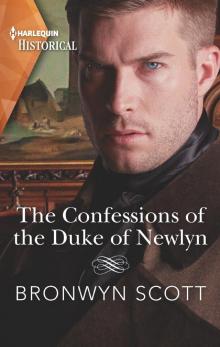 The Confessions of the Duke of Newlyn
The Confessions of the Duke of Newlyn The Passions 0f Lord Trevethow (The Cornish Dukes Book 2)
The Passions 0f Lord Trevethow (The Cornish Dukes Book 2)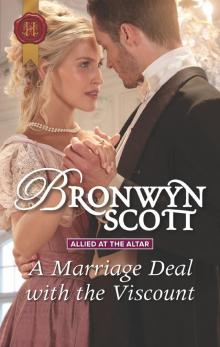 A Marriage Deal with the Viscount--A Victorian Marriage of Convenience Story
A Marriage Deal with the Viscount--A Victorian Marriage of Convenience Story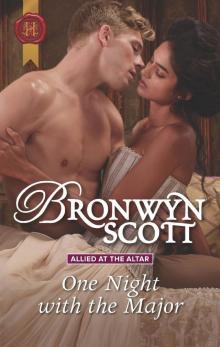 One Night with the Major
One Night with the Major The Passions of Lord Trevethow
The Passions of Lord Trevethow Grayson Prentiss's Seduction
Grayson Prentiss's Seduction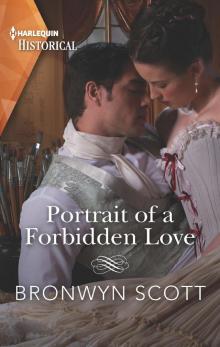 Portrait of a Forbidden Love--A Sexy Regency Romance
Portrait of a Forbidden Love--A Sexy Regency Romance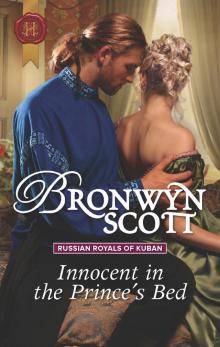 Innocent in the Prince's Bed
Innocent in the Prince's Bed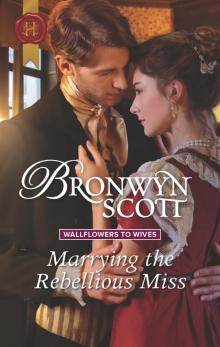 Marrying the Rebellious Miss
Marrying the Rebellious Miss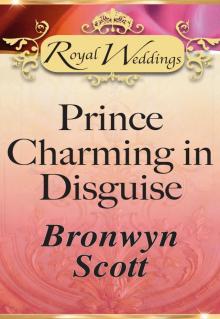 Prince Charming in Disguise
Prince Charming in Disguise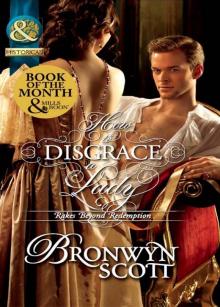 How to Disgrace a Lady
How to Disgrace a Lady Secrets of a Gentleman Escort
Secrets of a Gentleman Escort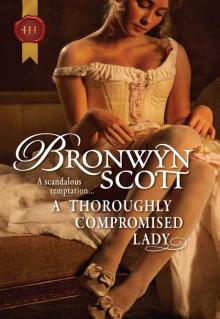 A Thoroughly Compromised Lady
A Thoroughly Compromised Lady Rake Most Likely to Seduce
Rake Most Likely to Seduce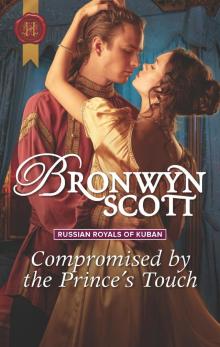 Compromised by the Prince's Touch
Compromised by the Prince's Touch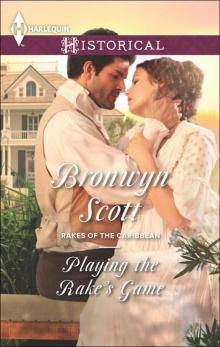 Playing the Rake's Game
Playing the Rake's Game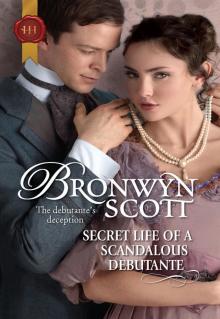 Secret Life of a Scandalous Debutante
Secret Life of a Scandalous Debutante Reckless Rakes - Hayden Islington
Reckless Rakes - Hayden Islington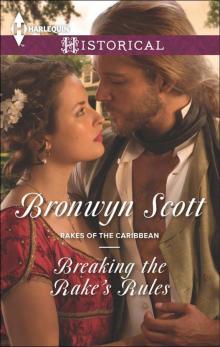 Breaking the Rake's Rules
Breaking the Rake's Rules Arabian Nights with a Rake
Arabian Nights with a Rake Unbefitting a Lady
Unbefitting a Lady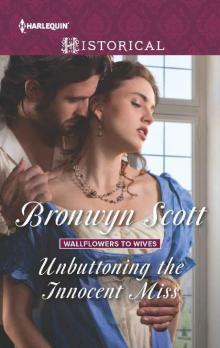 Unbuttoning the Innocent Miss (Wallflowers to Wives)
Unbuttoning the Innocent Miss (Wallflowers to Wives) London's Most Wanted Rake
London's Most Wanted Rake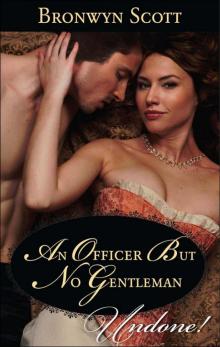 An Officer but No Gentleman
An Officer but No Gentleman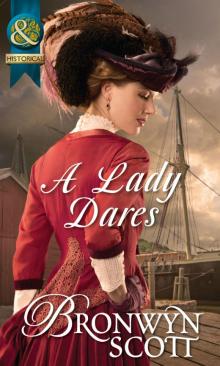 A Lady Dares
A Lady Dares A Most Indecent Gentleman
A Most Indecent Gentleman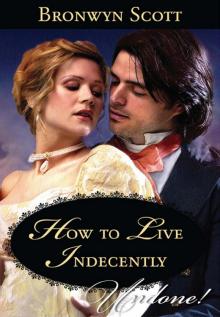 How to Live Indecently
How to Live Indecently Rake Most Likely to Sin
Rake Most Likely to Sin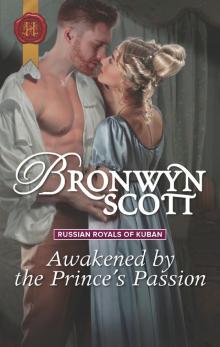 Awakened by the Prince's Passion
Awakened by the Prince's Passion Bronwyn Scott's Sexy Regency Bundle
Bronwyn Scott's Sexy Regency Bundle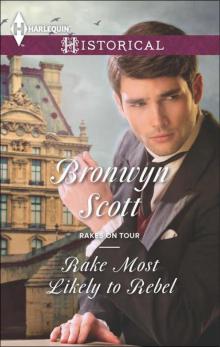 Rake Most Likely to Rebel (Rakes On Tour Book 1)
Rake Most Likely to Rebel (Rakes On Tour Book 1)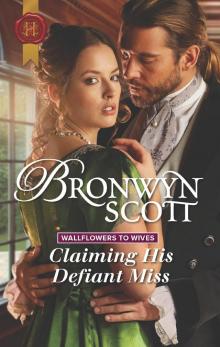 Claiming His Defiant Miss
Claiming His Defiant Miss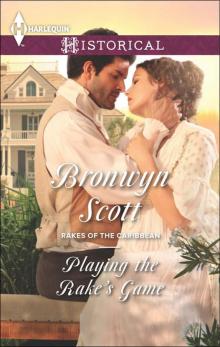 Playing the Rake's Game (Rakes Of The Caribbean Book 1)
Playing the Rake's Game (Rakes Of The Caribbean Book 1)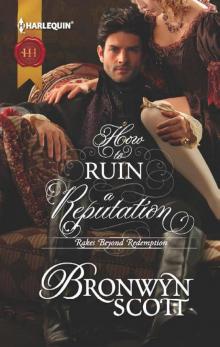 How to Ruin a Reputation (Rakes Beyond Redemption)
How to Ruin a Reputation (Rakes Beyond Redemption)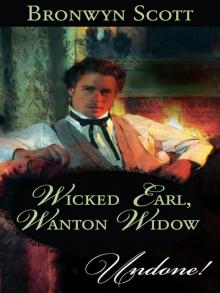 Wicked Earl, Wanton Widow
Wicked Earl, Wanton Widow Seduced by the Prince's Kiss
Seduced by the Prince's Kiss